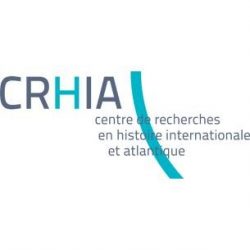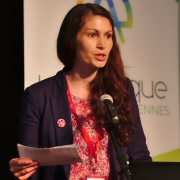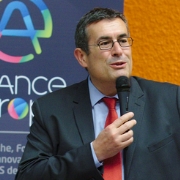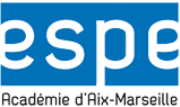A laboratory for innovative teaching about Europe.
This project was selected in the 2016 call for innovative projects and was supported by the European Idea Factory until 2020.

A laboratory for innovative teaching about Europe.
This project was selected in the 2016 call for innovative projects and was supported by the European Idea Factory until 2020.
The Laboratory for innovative teaching about Europe (LIPE) aims to create a digital platform bringing together innovative educational resources about Europe, produced by national and international research programmes. This multidisciplinary tool includes resources in French and English. It is initially aimed at French secondary school pupils, students and teachers. Later on, it could also target primary school pupils.
The educational resources can take the following forms: teaching sheets with examples of student productions, documentary files, videos and webdocumentaries, audio sources and radio broadcasts, MOOC, serious games, animated maps, iconographic resources and any other innovative form. LIPE will eventually provide support services to research programmes to assist them in the design of teaching resources. It will be autonomous, and will host other resources from research programmes by being known and identified by the academic and educational community.
Link to the online platform: www.lipe-europe.eu

The Research Centre for Atlantic and International History (EA 1163 – Universities of Nantes and La Rochelle)
The Research Centre for Atlantic and International History (EA 1163 – Universities of Nantes and La Rochelle)
The Research Centre for Atlantic and International History (EA 1163 - Universities of Nantes and La Rochelle) is one of the major historical research centres in Western France, approved by the Ministry of Higher Education and Research as part of the five-year contract 2017-2021.
This laboratory brings together researchers in ancient history, medieval history, modern history, contemporary history, literature and languages, totalling 151 members (48 full professors, 9 emeritus professors, 3 other researchers, 4 post-docs, 80 doctoral students and 7 administrative and technical staff) and 90 associate researchers around a common theme: “From the world to the Atlantic, from the Atlantic to the world: methods, spaces and actors of international exchanges from the Antiquity to the present day”.
https://www.crhia.fr/en

Virginie Chaillou-Atrous
Virginie Chaillou-Atrous
Doctor of Contemporary History. Lecturer and in charge of research support at the CRHIA, University of Nantes.
Virginie Chaillou-Atrous is a post-doctoral researcher at the Center for Research in International and Atlantic History (CRHIA) of the University of Nantes. She coordinates the work of Research Axis 4 (Europe, the Europeans and the world) of the EHNE laboratory of excellence (Writing a new history of Europe). She is a specialist in forced circulation and migration in the Western Indian Ocean. She is particularly interested in the history of African and Indian indentured servants in Reunion Island in the 19th century. She is the author of numerous articles and books including De l’Inde à la Réunion. Histoire d’une transition, l’épreuve du lazaret 1860-1882 (La Réunion, Océan Éditions, 2002) and Esclaves sous contrat. Histoire des engagés africains à La Réunion au XIXe siècle (Vendémiaire, 2016).
Virginie Chaillou-Atrous is co-leader of two projects supported by Alliance Europa: LIPE and DIASCOM.
Virginie.Chaillou@univ-nantes.fr
MICHEL CATALA
MICHEL CATALA
Professor of Contemporary History at the University of Nantes - Director of the Institute for European and Global Studies.
The director of the Institute for European and Global Studies since its creation in 2015, Michel Catala launched the RFI Alliance Europa programme in 2013, with Arnauld Leclerc. A university professor since 2004, he directed the CRHIA, a history laboratory bringing together 50 teacher-researchers and 89 doctoral students in Nantes and La Rochelle. He has a long practice of directing research structures and collective research programmes on the history of Europe on a regional (DCIE) and national (Labex EHNE) scale. A specialist in the history of international relations in Europe and the history of European construction, he has been teaching these subjects for 15 years. He is the author of numerous publications on these issues, and has also launched many international partnerships. He is the founding president of the Maison de l’Europe in Nantes, and is particularly familiar with civil society and local authority actors working on European issues in Nantes and the Loire region.
AEDE France – European Association of Teachers
AEDE France – European Association of Teachers
AEDE-France is a national section of the European Association of Teachers (AEDE/EAT), created in Paris in 1956, to promoting a better understanding of the European project among educational staff. Today, the AEDE/EAT is made up of 26 sections, 25 of which are in the Member States of the European Union and one in Switzerland.
http://www.aede-france.org/flashinfos.html
Faculty of Arts, Letters, Languages and Human Sciences of the University of Aix-Marseille
Faculty of Arts, Letters, Languages and Human Sciences of the University of Aix-Marseille
http://allsh.univ-amu.fr/
Labex EHNE – Writing a new history of Europe
Labex EHNE – Writing a new history of Europe
Reinserting the history of the European project and its implementation into general history implies a renewed writing of the history of Europe itself. This perspective is the foundation of the EHNE project, “Writing a new history of Europe”, approved by the Ministry of Higher Education and Research in a press release dated 14 February 2012, as one of the 71 winners of the second wave of the “Laboratories of Excellence” (LabEx) call for projects, with the mention “Investments in the future”.
The main objective of the EHNE project is to shed light on the current crisis in Europe by reconstructing a new historiography of Europe that is aimed at the scientific world as well as the teaching world, citizens and politicians.
Its ambition is to situate French historians of Europe and international relations at the heart of the main historiographical and contemporary debates. The project, which is to run for eight years, brings together the most notable French specialists on these issues, within powerful European and international networks. It is carried out by five partner laboratories from three institutions (Paris IV, Paris 1, Nantes).
http://labex-ehne.fr/en/presentation/Rectorate of the Academy of Nantes
Rectorate of the Academy of Nantes
The rectorate of the Academy of Nantes ensures the functioning of education in the Loire region. Its main area of competence is pedagogy.
http://www.ac-nantes.fr/INSPE, Nantes Higher School of Teaching and Education
INSPE, Nantes Higher School of Teaching and Education
On 1 September 2013, the ESPE (École supérieure du professorat et de l’éducation) of the Academy of Nantes became an internal school, part of the University of Nantes. It includes five training sites located in each of the five departments of the Academy of Nantes, and headquarters in Nantes.
It welcomes students enrolled in the “Teaching, Education and Training Professions” Masters (MEEF), establishing the necessary collaborations with the other components of the University of Nantes as well as with the Universities of Maine and Angers.
It is also involved in the University’s in-service training for teachers and contributes to the development of educational research.
https://inspe.univ-nantes.fr/
ESPE, Aix-Marseilles Higher School of Teaching and Education
ESPE, Aix-Marseilles Higher School of Teaching and Education
In the cities of Avignon, Aix-en-Provence, Digne-les-Bains and Marseilles, the Aix-Marseilles ESPE (École supérieure du professorat et de l’éducation) trains future teachers, but also students who are attracted by other educational professions and those who wish to develop skills in the field of teaching, education and training.
http://espe.univ-amu.fr/
STARACO
STARACO
The STARACO project means to engage in a four-year historical reflection on the question of differences in status and colour, on the historical construction of “races” and the hierarchies that have resulted from them. The theme of the construction of racial hierarchies in the Atlantic experience will be a way of rethinking both the history of relations between Europe and “Southern” peoples and the emergence of colour or “race” prejudice whose effects can still be felt in European societies.
The Loire region, the University of Nantes, the CRHIA and the Casa de Velázquez are the main partners in the STARACO project.
http://staraco.univ-nantes.fr/fr